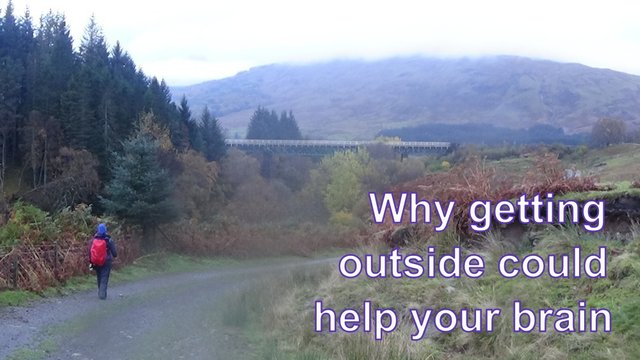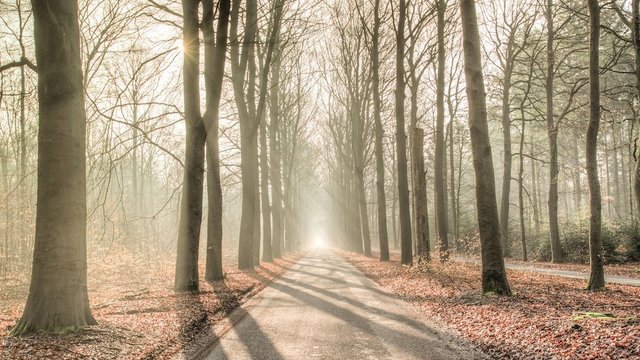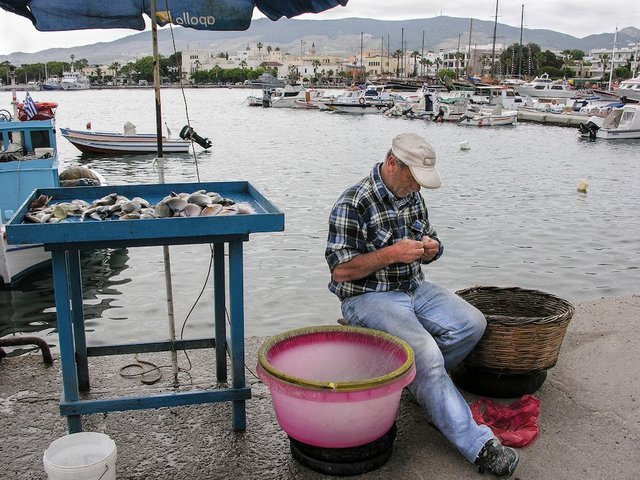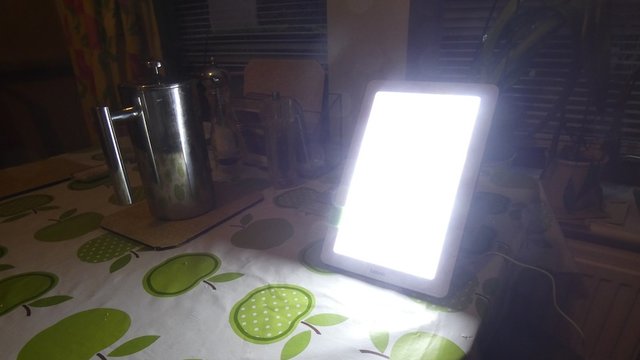Could daylight prevent mental decline?

My grandmother was a wise lady. Her solution to many ailments was simple:
"Get some fresh air!"
Fresh air usually means daylight, and daylight is increasingly being scientifically proven to promote good health.
I wrote about the importance of daylight in May, but since then my mother became very ill with pneumonia. She also has an aortic stenosis, and the combined effect was that she suffered hypoxia, or lack of oxygen to the brain, resulting in bouts of delirium.
I described these symptoms in my last post.
Conventional medicine has been of crucial importance in treating these conditions. Mum has to take eight tablets a day. But natural treatments are just as important – especially, it seems, daylight, as I also described in my previous post.

Simple solutions: exposure to daylight has brought about a remarkable improvement in my mum's condition. Source
The effects have been so remarkable, I wanted to write more about them, and look at some of the scientific research into this.
Natural treatments
Over the past few months, I've noticed that sleep, light, water and nutrition seem to have enormous benefits on Mum's mental as well as physical health.
And it seems that these "natural therapies" are being taken more seriously by the medical establishment – at least in Scotland, where we live. When Mum was in hospital in July, at the Queen Elizabeth University Hospital, which was opened just four years ago, me and my sister noticed how healthy and varied her meals were – very unlike the bland hospital food of the past.
Mum's hospital room had a large window, letting lots of light in. There was a day room at the end of the ward, that had huge windows letting in lots of light and offering panoramic views over the city.
The temperature always seemed to be just right, not like the overheated hospital wards of the past.
And the staff were fantastic – really caring and considerate to all of us.
Nutritional challenge
One of the big problems I've had to deal with is getting Mum to eat. Her appetite declined a lot with the pneumonia, and it was weeks before she was eating anything like a full meal. Even now she's eating about two-thirds of what she used to, and she's lost a lot of weight.
As her appetite started to increase more, I noticed that her mental condition also started to improve.

Mum loves fruit salad, especially with fresh berries. And good nutrition really seems to boost mental function. Source
Good nutrition seems to play a crucial role in the functioning of the mind, especially in elderly people. It could be due to the gut bacteria – I've read that a more varied diet can enhance the friendly bacteria in the gut, boosting the immune system, though scientific research into this is currently at a very early stage.
The "anti-dementia diet"
A local newspaper recently ran a story about a man who apparently dramatically improved his mother's dementia by putting her on a healthier diet, which included not just fish, but blueberries, strawberries and walnuts.
Mum loves fruit! Even when her appetite was at its weakest, after she'd been treated for pneumonia, when I asked her if she wanted fruit salad, she would always say "Yes please!"
I always try to make the fruit salad with bananas and fresh berries, often adding mango and passion fruit, which Mum loves. She also loves my home-made soup.
In the newspaper report mentioned above, Mark Hatzer was quoted as saying:
"In certain countries Alzheimer’s is virtually unheard of because of their diet."
I couldn't find any scientific research to back this up, but I did find a lot of anecdotal information about dementia being "almost unheard of" in the Greek Island of Ikaria, whose population of 8-10,000 live, on average, 8 to 10 years longer than most Americans.
A bestselling book called The Blue Zones Solution: Eating and Living like the World's Healthiest People, by Dan Buettner, looks at global locations that have some of the world's longest-lived people, including Okinawa (Japan), Sardinia (Italy), the Nicoya Peninsula of Costa Rica and Loma Linda, California – as well as Ikaria.
I haven't read the book, though it does sound interesting. The author's website says that diet, social contact and moving about are key to the health and longevity of people in these areas.
The one thing the book and the masses of information online about it don't seem to focus on specifically is...
... exposure to daylight!
Activity is frequently mentioned in relation to the "blue zones". The people living in these areas walk or cycle regularly, do gardening and other outdoor activities – and the advice to people who want to mimic their lifestyle is to "get active".
Which I think is a great thing! However...
I think the key is to do it in daylight. Don't just stay in the gym – get out into the great outdoors!
I've visited Greece several times, and I noticed (with envy) that in rural areas, the local people seemed to sit around in the sun a lot! They linger in the sunshine after an outdoor lunch. They drink coffee and Metaxa in outdoor cafés.

Simply getting outside could be key to a healthier life. Source
And they don't just sit. I've encountered Greek islanders walking around in olive groves, zipping about on mopeds, fishing, swimming and farming. It's maybe not surprising that much of life on a Greek island is spent out of doors – very different from life in the cold, rainy part of the world where I live!
I suspect that this is the case in many of these "blue zones".
We tend to take daylight for granted. It's there half of the time. In developed countries, most of us work indoors, and many people don't even venture outside at lunchtime.
It's very different from the old days, when many cultures worshipped the sun.

A 19th century image of the Japanese Sun Goddes Ameratsu. Source
I think that daylight is a lot more important than most of us realise. We are waking up to the importance of vitamin D, which I've written about before. Vitamin D is a hormone produced by the body, but sunlight is necessary to make it.
Circadian rhythms
But daylight is also vital for the regulation of our internal "body clock" via the production of another hormone, melatonin. According to a 2008 report from the British Journal of Opthalmology, exposure to a part of the natural light spectrum known as "blue light" is essential for the regulation of circadian rhythms. Ageing decreases the efficiency of the photoreceptors in the lens of the eyes that absorb this type of light.
OK, I'm biased. I'm an obsessive hillwalker, and I love getting outdoors in all kinds of weather. But you don't have to stay outdoors for hours to get the benefits of the blue light part of the spectrum. Research at the University of California found that 2,500 lux of white, broadband light at the cornea for two hours, or 10,000 lux for 30 minutes could have a therapeutic effect.
That's equivalent to getting outside for two hours on a cloudy day or 30 minutes on a sunny day.
Alternatively you could use a "SAD" (seasonal affective disorder) lamp. We bought one for Mum, and I've been experimenting with putting it on a few metres away her for 20 minutes, twice a day.

A "SAD lamp" can provide daylight stimulus to the brain, but they are very powerful and there can be some side-effects.
I'm being a little bit cautious, as I've read that sudden exposure to these lamps can trigger headaches and eye strain, so I've been careful not to position the lamp directly towards her while it's switched on.
I also take Mum out for a walk at least once a day – ideally in the morning, as that's when exposure to daylight seems to be most important. I'm hoping that she'll be able to get out on her own again after a while.
So far, so good...
I'm crossing my fingers – it's early days, but so far, so good. The weather has been horrible recently and the days continue to get shorter and shorter. But in the past two weeks since her unexpected night walk, Mum has been relaxed and rational, with only one brief bout of delirium last week.

A typical rainy day in Glasgow. But even in this kind of weather it's beneficial to get outside for a bit – even just to go for a drive.
The best thing is that my "real" Mum seems to be back. The delirium makes her weirdly snappy and crochety. She treats me as if I'm her jailer. My psychiatrist sister says it's actually paranoia, which is often an effect of delirium.
But over the past fortnight, she's been my wonderful loving Mum again.
All images are author's own, unless otherwise shown.
Posted from my blog with SteemPress : http://ramblingandscrambling.co.uk/health/could-daylight-prevent-mental-decline/

.gif)

I'm so glad for you that your Mom has been improving, but I definitely believe this to be a fact; my 88 yr old mother is very particular with her diet but when we have too many dull days, she actually gets very moody!
Very well written and informative blog @natubat!
Posted using Partiko Android
Thanks @lizelle! It certainly seems to be working so far, though trying to get daylight and sunshine in the west of Scotland is not an easy task!
you've been visited by @agiftoflove on behalf of Natural Medicine!
This is such great information! Getting outside in the fresh air and sunlight, especially around nature is medicine. Circadian Rhythms are very important too, as we are connected to the world around us. It is great to hear she is doing better with more natural treatments! So happy you are there with here too, love is it's own medicine, nourishing the heart.
Thanks for your kind words. It makes a huge difference, and doesn't cost a thing :)
Good advice, my mother always stayed inside and didn't exercise enough. Then she got high blood pressure and was put on a slew of pharmaceuticals and now has dementia. Best to get outside and avoid future problems.
Posted using Partiko Android
Thanks for your comment sketch.and.jam, and I'm sorry to hear about your mum's condition.
I to had a grandmother, well fact it was a great Aunt who was like a grandmother to me as my Grandparents all passed before I was born who said the same about getting out and getting fresh air
And I do think it is very true a good diet mild exercise and fresh air even on aa grey day is something we should all try to achieve
Yes it makes you feel so much better too.
Those old folks had a lot of wisdom. In the first half of the 20th century, hospitals used to regularly wheel patients outside to get fresh air. I don't know why that practice was stopped!
Funny you should mention wheeling patients outside after reading your posts I was taking with my wife and said the same thing
Actually it was proven by scientists that going into nature has huge power to both your health and body :D
It certainly was, though the scientific research I've linked in the post was specifically about the effect of light on elderly people and how it can regulate their circadian rhythms, and the link with dementia.
I see. I would recommend you to also use the tag #steemstem for this kind of scientific posts. They support such authors with a nice upvote :)
Thanks Gabriela! I always feel that my posts might be judged not scientific enough, lol! :)